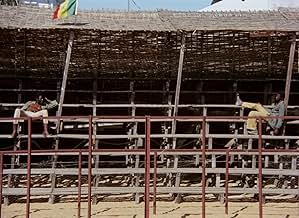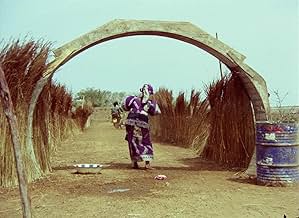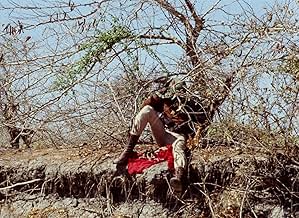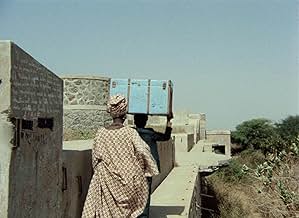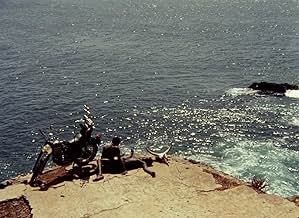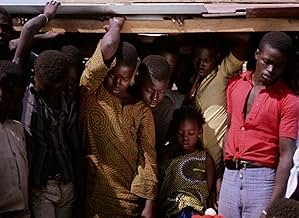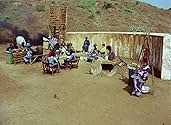VALUTAZIONE IMDb
7,0/10
4455
LA TUA VALUTAZIONE
Mory, un pastore, e Anta, una studentessa universitaria, cercano di fare soldi per andare a Parigi e lasciarsi alle spalle il loro noioso passato.Mory, un pastore, e Anta, una studentessa universitaria, cercano di fare soldi per andare a Parigi e lasciarsi alle spalle il loro noioso passato.Mory, un pastore, e Anta, una studentessa universitaria, cercano di fare soldi per andare a Parigi e lasciarsi alle spalle il loro noioso passato.
- Regia
- Sceneggiatura
- Star
- Premi
- 2 vittorie e 1 candidatura in totale
Myriam Niang
- Anta
- (as Mareme Niang)
Josephine Baker
- Joséphine Baker
- (voce)
- (as Joséphine Baker)
Recensioni in evidenza
Disorienting and at times even a bit schizophrenic, this is an extraordinarily vibrant, pulsating, and eccentric film. Comparisons to the anarchic, jumpy, free-associative style of the French New Wavers are not far off, but there's something much more erotic and carnal in the film's playfulness.
The story of self-assured college beauty Anta and her fella - Mory the motorcycle-riding herdsman - starts in Dakar and wistfully wanders toward Paris, the seemingly unattainable city of their dreams. Their get-rich-quick schemes and the breezy, colorful manner in which they unfold are funny and inspired.
Along the way, there are sequences of both utter hilarity and genuine depth, although the film does sometimes seem unsure of its many potentially-symbolic representations. But the stylistic narrative and experimental technical aspects are so full of ideas that talk of the film's minor weaknesses seems trivial.
The soundtrack is outstanding, full of syncopation and polyrhythms pacing the film and giving a rich texture to the images. And there's constant movement, until the film's denouement where character, story, camera and concept fuse together in common paralysis, where all seems frozen in reflection.
The story of self-assured college beauty Anta and her fella - Mory the motorcycle-riding herdsman - starts in Dakar and wistfully wanders toward Paris, the seemingly unattainable city of their dreams. Their get-rich-quick schemes and the breezy, colorful manner in which they unfold are funny and inspired.
Along the way, there are sequences of both utter hilarity and genuine depth, although the film does sometimes seem unsure of its many potentially-symbolic representations. But the stylistic narrative and experimental technical aspects are so full of ideas that talk of the film's minor weaknesses seems trivial.
The soundtrack is outstanding, full of syncopation and polyrhythms pacing the film and giving a rich texture to the images. And there's constant movement, until the film's denouement where character, story, camera and concept fuse together in common paralysis, where all seems frozen in reflection.
I went to the London Film Festival in October 2008 to watch a film from the past, a "Treasure from the Archive". However whilst Touki Bouki was made over 35 years ago it still remains incredibly relevant. Young Africans still drown trying to cross the Straits of Gibraltar to Europe every day. That's what this film is about, the desperation of ordinary Africans (specifically from a Senegalese perspective) yearning to find prosperity and stability. It's one of those films I would class as a "scream of despair". Even if there are some very funny scenes, these scenes are like the scenes of humour that Ford would inject into his Westerns to mollify audience gloom. It would not surprise me if that were a direct influence, but if he wasn't cine-literate, then Djibril must rank as the most precocious director of all time.
The bare bones of the plot of the film concerns Mory, who is a sometime cattle herder, and Anta his girlfriend who is a university student. This especially winsome couple want desperately to escape to Europe. Mory is the object of ridicule in his community, intelligent, but useless and uppity, whilst Anta's university is no real safe-haven of learning, what with it being full of decadent revolutionaries (not an oxymoron). Both yearn to live in France.
As close to a true narrative as we get is that they go to a wrestling match and attempt to steal the stadium's cash box. There are two boxes, a yellow one and a blue one, they can't take both and aren't sure which one holds the loot. They take the blue one and when they get to their deserted, ruined, ex-colonial bunker hideout realise that it is filled with Voodoo craziness, runes and skulls and such. This for me is high Surrealism.
Plan B is to steal clothes, money, and a car off a rich idler who lives in a seaside villa surrounded by catamites. Plan B is successful, exeunt Mory and Anta pursued by the lo (sic).
Dressed as highfalutin dandies they revisit Mory's community driving in a stars-and-stripes festooned car where they are treated as a Lord and his Lady. Whether this is actual plotting or wish-fulfilment dreaming is left up to the viewer to decide.
After Fellinian parades of the mind the story returns to earth with a bump as Mory and Anta reach a port and try to escape to France.
One thing that stands out in the film is the anti-French criticism. The French bourgeois who make their living in Senegal are shown as treating Senegalese as some sort of bonobo-child chimeras. Also there is the aforementioned wrestling match, which is a "charity" event organised to raise money to build a statue of General de Gaulle (the height of absurdism?). This is also internally-driven criticism as the organisers are chiefs of a Senegalese tribe.
The film is ambivalent about life in Senegal, whilst Mory and Anta yearn to leave, Mambéty also shows us beautiful scenes of daily life in Senegal, and the humour of the populace. One part for me stands out, a parade of Senegalese carrying water on their heads in semi-transparent plastic buckets, the sunlight shining through the buckets transforms them into preternatural magic lanterns, the framing is exquisite, the camerashot is filled with green and blue corruscation. The point is that this guy Mambéty is not some sort of amateur who is esteemed out of political correctness, this guy is a force of nature, a director whose capability of expression is really begging to be called primus inter pares when compared to the likes of Parajanov and Bunuel.
One strong warning is that this movie contains scenes of cattle being slaughtered both in abbatoirs and outside of them, right at the start of the film. Really gruesome in the extreme, and far more graphic for example than the familiar scene of an ox being slaughtered in Apocalypse Now. The point of it is metaphorical, young African men are treated as no less than cattle to be slaughtered, fodder for the consumer games of power structures, ultimately commoditised.
The bare bones of the plot of the film concerns Mory, who is a sometime cattle herder, and Anta his girlfriend who is a university student. This especially winsome couple want desperately to escape to Europe. Mory is the object of ridicule in his community, intelligent, but useless and uppity, whilst Anta's university is no real safe-haven of learning, what with it being full of decadent revolutionaries (not an oxymoron). Both yearn to live in France.
As close to a true narrative as we get is that they go to a wrestling match and attempt to steal the stadium's cash box. There are two boxes, a yellow one and a blue one, they can't take both and aren't sure which one holds the loot. They take the blue one and when they get to their deserted, ruined, ex-colonial bunker hideout realise that it is filled with Voodoo craziness, runes and skulls and such. This for me is high Surrealism.
Plan B is to steal clothes, money, and a car off a rich idler who lives in a seaside villa surrounded by catamites. Plan B is successful, exeunt Mory and Anta pursued by the lo (sic).
Dressed as highfalutin dandies they revisit Mory's community driving in a stars-and-stripes festooned car where they are treated as a Lord and his Lady. Whether this is actual plotting or wish-fulfilment dreaming is left up to the viewer to decide.
After Fellinian parades of the mind the story returns to earth with a bump as Mory and Anta reach a port and try to escape to France.
One thing that stands out in the film is the anti-French criticism. The French bourgeois who make their living in Senegal are shown as treating Senegalese as some sort of bonobo-child chimeras. Also there is the aforementioned wrestling match, which is a "charity" event organised to raise money to build a statue of General de Gaulle (the height of absurdism?). This is also internally-driven criticism as the organisers are chiefs of a Senegalese tribe.
The film is ambivalent about life in Senegal, whilst Mory and Anta yearn to leave, Mambéty also shows us beautiful scenes of daily life in Senegal, and the humour of the populace. One part for me stands out, a parade of Senegalese carrying water on their heads in semi-transparent plastic buckets, the sunlight shining through the buckets transforms them into preternatural magic lanterns, the framing is exquisite, the camerashot is filled with green and blue corruscation. The point is that this guy Mambéty is not some sort of amateur who is esteemed out of political correctness, this guy is a force of nature, a director whose capability of expression is really begging to be called primus inter pares when compared to the likes of Parajanov and Bunuel.
One strong warning is that this movie contains scenes of cattle being slaughtered both in abbatoirs and outside of them, right at the start of the film. Really gruesome in the extreme, and far more graphic for example than the familiar scene of an ox being slaughtered in Apocalypse Now. The point of it is metaphorical, young African men are treated as no less than cattle to be slaughtered, fodder for the consumer games of power structures, ultimately commoditised.
The first important thing to say is that I hope that no animals are ill treated or killed in the course of filming which is unacceptable and strictly forbidden. The images are powerful indeed in terms of scenes, surroundings and people's faces, bodies, expressions and behaviours. The action takes place in Senegal and the story is simple and well shown. A cow herd and a university student are longing to leave Senegal and emigrate to Paris. They try to succed in that by doing a lot of things including stealing money from other people to pay for a ship travel to France. Through it we see and are aware of the life and usages of the Sebegalese lower social class. All well filmed, directed and acted. And last but not least we listen on the background part of a Parisian song by the beautiful voice of Josephine Baker.
An African film here about youth, about the thirst to escape from a place that parches it and the bike ride through dirt roads out to sea where a ship sails for Europe. But I want to avoid merely a museum visit or an aesthetic token from a faraway place, I want the heart that pounds behind appearances and gives rise to their breeze of color. What heart here?
First are the things he says about the home that is left behind. Symbolic cows being led to slaughter and cut to the young lead riding his motorbike with cow horns on the wheel. A stolen chest, supposedly full of money to pay for a DeGaulle statue but it contains a corpse.
These are the things the filmmaker knows exactly what he wants to say about. They're also the least interesting to watch for me. The young lead being wrestled by leftist students is intercut with cows being wrestled before the slaughter. The dear bike stolen by a savage white man and left broken while he's extracted with merely a broken leg. Not without nuance, but some of it is as didactic as we make fun of Hollywood.
More tantalizing is the journey through these to outrun them, even more so once you realize this is the same journey the filmmaker himself made from that same port. A yearning for freedom, but the desired freedom is a life of material comforts in Europe, what every boy his age would dream about, cafés and girls. Meanwhile the girl meekly tugs along behind her childish man. There's a sense that she quietly yearns for more; but she also feels beautiful in the (stolen) pink suit and red hat, as any girl would. I like films where youth is embraced with its dreams and folly, this is one.
But also a deeper heart, things which the filmmaker doesn't know how to express clearly but vaguely feels stirring. There are a few of these where the surface of the film is rippled by some hidden vortix that seems to rage in the deep, like when the girl thinks he has drowned. If the journey is Godard, this is Pasolini. This might be part of what some reviews note as sloppy technique. True. This is a man still trying to fathom how images can surround a feel.
So this is it here, a journey where as these two lovers flee, they get caught up in situations that tear from them images of who they are and what their surrounding world is like, images the air takes along which become the film. In the end one self is left behind, the one who has not outrun this world.
First are the things he says about the home that is left behind. Symbolic cows being led to slaughter and cut to the young lead riding his motorbike with cow horns on the wheel. A stolen chest, supposedly full of money to pay for a DeGaulle statue but it contains a corpse.
These are the things the filmmaker knows exactly what he wants to say about. They're also the least interesting to watch for me. The young lead being wrestled by leftist students is intercut with cows being wrestled before the slaughter. The dear bike stolen by a savage white man and left broken while he's extracted with merely a broken leg. Not without nuance, but some of it is as didactic as we make fun of Hollywood.
More tantalizing is the journey through these to outrun them, even more so once you realize this is the same journey the filmmaker himself made from that same port. A yearning for freedom, but the desired freedom is a life of material comforts in Europe, what every boy his age would dream about, cafés and girls. Meanwhile the girl meekly tugs along behind her childish man. There's a sense that she quietly yearns for more; but she also feels beautiful in the (stolen) pink suit and red hat, as any girl would. I like films where youth is embraced with its dreams and folly, this is one.
But also a deeper heart, things which the filmmaker doesn't know how to express clearly but vaguely feels stirring. There are a few of these where the surface of the film is rippled by some hidden vortix that seems to rage in the deep, like when the girl thinks he has drowned. If the journey is Godard, this is Pasolini. This might be part of what some reviews note as sloppy technique. True. This is a man still trying to fathom how images can surround a feel.
So this is it here, a journey where as these two lovers flee, they get caught up in situations that tear from them images of who they are and what their surrounding world is like, images the air takes along which become the film. In the end one self is left behind, the one who has not outrun this world.
I recently showed this film to a group of students so what follows is a condensed version of the worksheet I gave them. The questions I give hopefully can assist others in making meaning from the film.
Touki Bouki can best be made sense of in the following way: It operates through allusion and symbolism. Through the story of two young lovers, Mory and Fanta, clashing with the older generation, yearning to leave for Paris, Mambety puts on screen his vision of a country where the weight of thousands of years of tradition collides head on with the modernity of a newly emergent Senegal.
Allusion...an implied or indirect reference hinting at something
Symbol...something that stands for something else...something concrete that represents or suggests another thing that cannot in itself be represented or visualised...for example a lion symbolises courage
Think about what you have seen (and heard!) in the film, paying special attention to:
Mory's motorbike – what is it decorated with? What do those objects remind you of? Fanta ties it to a tree, in the midst of a herd of cows...is there a connection to the cows?
The long scene in the first half of the film, when there are lots of shots of the sea, then we see Mory and Fanta together on the cliffs talking about leaving for France
The transformation of the Aunt from an unsympathetic character in the first half of the film to a praise singer in the second.
Charlie's car which Mory and Fanta ride off in after robbing him is a Citroen painted in the flag of which country? How is it positioned in relation to the motorbike and the welcomers?
1. How do you think the following things are alluded to in the film?
The act of lovemaking The city of Paris The cycles of life – birth, death, birth
2. How do you think the following things are symbolised in the film?
African tradition African modernity – this film is made soon after Senegal gained independence The ties which hold us, such as family, friends, our familiar environment Colonial power The primitive
Other points to consider...
Mambety inserts documentary footage from actual events, such as the women at the well, a wrestling competition, street children and a Presidential motorcade, into a fiction film. Do these scenes have anything to do with the story? What effect do they have on you, the viewer? What's your response to them? Why might they be in the film?
Certain images and sounds are repeated in the film, such as the ocean, the crows, the cries of the taxi driver who runs away from the box then repeated by the caveman. What effect does this have? Does it 'organize' the film in any way?
Answers... Mory's motorbike symbolizes Africa, in the scene after they ve robbed Charlie, it s positioned in such a way against the Citroen that the two seem oppositional. The Citroen is a French car decorated with the US flag stars and stripes so representing both French colonialism and US imperialism. The sea is a symbol for lovemaking. The cycles of nature are implied in the scenes of cattle slaughter and goat being sacrificed. Fanta ties the motorbike up as if shes trying to hold at bay the forces of modernity, of change. is the film trying to reconcile two opposing aspects, yearning for the past and tradition while simultaneously embracing modernity, the new? Whose the weird, white looking caveman up in the tree? Its as if Mambety shoves our images of 'primitive' Africans back in faces, also in the dream sequence when Mory and Fanta sit in the car, dressed in 1930s clothes smoking, being sung praises by Aminata Fal is a parody of successful Europeans. There's so much I d love to write about this film...Paris is reduced to a notion, an idea, a fantasy, brought to life through a clichéd song by Josephine Baker. On another level I read Touki Bouki as being about how Europe positions Africa and Africa positions Europe as exotic other. I m running out of space here, loads I could write about this film, hope this is useful, ENJOY!
Touki Bouki can best be made sense of in the following way: It operates through allusion and symbolism. Through the story of two young lovers, Mory and Fanta, clashing with the older generation, yearning to leave for Paris, Mambety puts on screen his vision of a country where the weight of thousands of years of tradition collides head on with the modernity of a newly emergent Senegal.
Allusion...an implied or indirect reference hinting at something
Symbol...something that stands for something else...something concrete that represents or suggests another thing that cannot in itself be represented or visualised...for example a lion symbolises courage
Think about what you have seen (and heard!) in the film, paying special attention to:
Mory's motorbike – what is it decorated with? What do those objects remind you of? Fanta ties it to a tree, in the midst of a herd of cows...is there a connection to the cows?
The long scene in the first half of the film, when there are lots of shots of the sea, then we see Mory and Fanta together on the cliffs talking about leaving for France
The transformation of the Aunt from an unsympathetic character in the first half of the film to a praise singer in the second.
Charlie's car which Mory and Fanta ride off in after robbing him is a Citroen painted in the flag of which country? How is it positioned in relation to the motorbike and the welcomers?
1. How do you think the following things are alluded to in the film?
The act of lovemaking The city of Paris The cycles of life – birth, death, birth
2. How do you think the following things are symbolised in the film?
African tradition African modernity – this film is made soon after Senegal gained independence The ties which hold us, such as family, friends, our familiar environment Colonial power The primitive
Other points to consider...
Mambety inserts documentary footage from actual events, such as the women at the well, a wrestling competition, street children and a Presidential motorcade, into a fiction film. Do these scenes have anything to do with the story? What effect do they have on you, the viewer? What's your response to them? Why might they be in the film?
Certain images and sounds are repeated in the film, such as the ocean, the crows, the cries of the taxi driver who runs away from the box then repeated by the caveman. What effect does this have? Does it 'organize' the film in any way?
Answers... Mory's motorbike symbolizes Africa, in the scene after they ve robbed Charlie, it s positioned in such a way against the Citroen that the two seem oppositional. The Citroen is a French car decorated with the US flag stars and stripes so representing both French colonialism and US imperialism. The sea is a symbol for lovemaking. The cycles of nature are implied in the scenes of cattle slaughter and goat being sacrificed. Fanta ties the motorbike up as if shes trying to hold at bay the forces of modernity, of change. is the film trying to reconcile two opposing aspects, yearning for the past and tradition while simultaneously embracing modernity, the new? Whose the weird, white looking caveman up in the tree? Its as if Mambety shoves our images of 'primitive' Africans back in faces, also in the dream sequence when Mory and Fanta sit in the car, dressed in 1930s clothes smoking, being sung praises by Aminata Fal is a parody of successful Europeans. There's so much I d love to write about this film...Paris is reduced to a notion, an idea, a fantasy, brought to life through a clichéd song by Josephine Baker. On another level I read Touki Bouki as being about how Europe positions Africa and Africa positions Europe as exotic other. I m running out of space here, loads I could write about this film, hope this is useful, ENJOY!
Lo sapevi?
- QuizThis film is believed to be Africa's first avant-garde film, although Soleil Ô (1970) could also make this claim.
- ConnessioniFeatured in Caméra d'Afrique (1983)
- Colonne sonoreParis, Paris, Paris
(Madrid) (uncredited)
Music by Agustín Lara
Spanish lyrics by Agustín Lara
French lyrics by Georges Tabet
Performed by Josephine Baker
I più visti
Accedi per valutare e creare un elenco di titoli salvati per ottenere consigli personalizzati
- How long is Touki Bouki?Powered by Alexa
Dettagli
Botteghino
- Lordo in tutto il mondo
- 180 USD
- Tempo di esecuzione
- 1h 25min(85 min)
- Mix di suoni
- Proporzioni
- 1.37 : 1
Contribuisci a questa pagina
Suggerisci una modifica o aggiungi i contenuti mancanti

